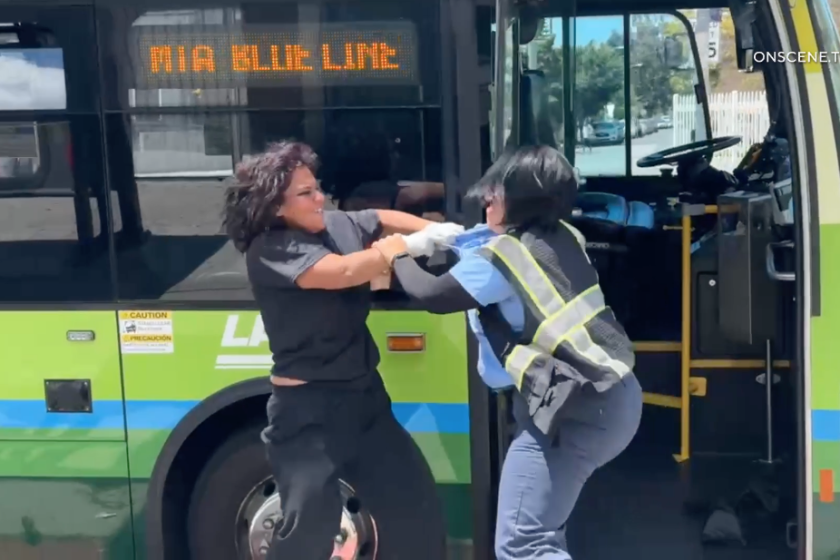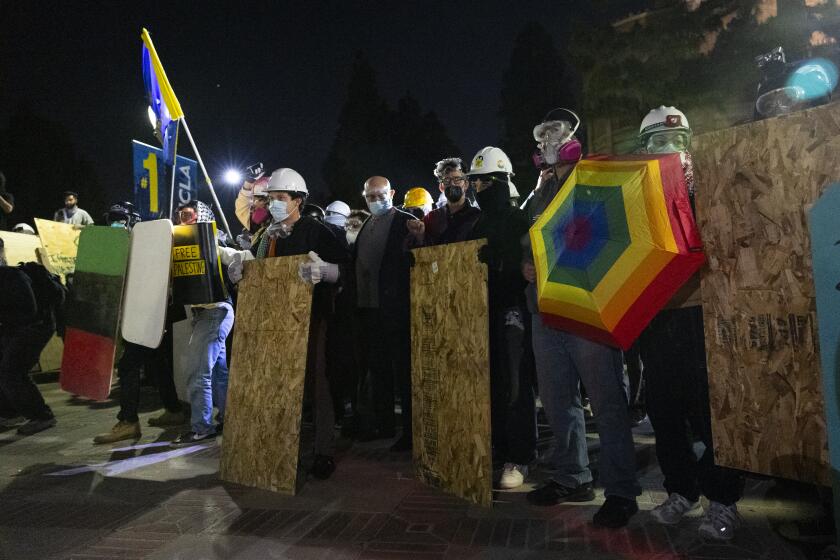Ventura Councilmen Debate Initiatives to Preserve Farmland : Environment: Bennett says they would prevent urban sprawl, but Tingstrom says suits would result.
Ventura Councilmen Steve Bennett and Jack Tingstrom squared off Tuesday in a debate over preserving open space versus the rights of property owners to do with their land what they please.
Hosted by the Ventura Chamber of Commerce, the lunchtime discussion centered on two initiatives before voters in November.
For the record:
12:00 a.m. June 23, 1995 For the Record
Los Angeles Times Friday June 23, 1995 Ventura West Edition Metro Part B Page 8 Zones Desk 1 inches; 31 words Type of Material: Correction
Wrong information--A story Wednesday incorrectly reported the percentage of votes needed to pass two greenbelt initiatives on the Ventura ballot in November. The measures require a simple majority vote for passage.
Both measures were placed on the fall ballot after the group Save Our Agricultural Resources (SOAR) collected thousands of signatures supporting the greenbelt initiatives.
The first measure would require voters to approve zoning changes on farmland within the city and its sphere of influence. Those land-use decisions are normally reserved for the City Council.
But because that proposed law has never been tested in court, SOAR members worked to qualify a second measure that requires voter approval before farmland in the Comprehensive Plan--the city’s chief planning document--could be rezoned.
A model of the second initiative was upheld by the state Supreme Court earlier this year following a lawsuit in Northern California.
Facing a business-minded chamber audience, Bennett warned that without the greenbelt initiatives western Ventura County would become like the San Fernando Valley--a ceaseless maze of freeways, strip malls and traffic lights.
“Counting on local councils to stop urban sprawl simply has not worked,” Bennett told the 150 or so in attendance. “The whole Oxnard Plain will become urbanized if we stay with our status quo. It’s just a matter of time.”
Tingstrom, elected on a pro-business platform four years ago, said the SOAR initiatives amount to “ballot box planning” and suggested they would lead to costly litigation.
“A plan is a plan,” Tingstrom said. “It’s only as good as the day it was written. It has to be reviewed.”
The community should help farmers stay in business instead of forcing them to farm acreage they might rather sell to developers, Tingstrom said.
“We should be taking the restrictions off so they can continue to farm and keep [the land] in the family,” he said, citing regulations on the use of pesticides, water and other farming supplies.
With three council seats up for grabs in November, growth is certain to become a major campaign issue among voters.
Tingstrom has not formally declared he will run again, but he has told friends he plans to seek reelection. Mayor Tom Buford said he will not run again, and Councilman Gregory L. Carson is still considering a second term.
The Ventura City Council earlier this week voted unanimously to place the second initiative on the fall ballot, rather that enact the measure into law on its own.
Both greenbelt initiatives affect about 3,000 acres of farmland in and around Ventura that is cultivated by 84 farming operations. They both require two-thirds of voters to approve any changes in farmland zoning.
Should the measures receive more than 50% of the votes this fall, “you’ll probably see 84 lawsuits,” Tingstrom said. “And I couldn’t blame them at all.”
Environmentalists like Bennett say the measures are essential to ensuring that lemon groves, strawberry fields and lettuce patches are not gobbled up by home builders and shopping mall developers.
Studies show that once-predominantly agricultural areas like the San Fernando Valley and Orange County slide into urbanization when fewer than 80,000 acres of farmland is preserved, Bennett said.
“Ventura County now has 95,000 acres and we’re losing thousands of acres a year,” Bennett said.
Bennett said the private-property argument is flawed and that citizens routinely regulate land uses by participating in the public process. “We all live with zoning laws,” he said.
But Tingstrom countered that there was no analysis given on the impact of requiring all farmland to stay zoned for agriculture. He argued that the greenbelt initiatives are unnecessary because voters ultimately make such planning decisions every four years when they elect council members.
“I don’t see any indication that we [the City Council] are running off trying to divide up the greenbelt,” he said. “If you don’t trust us, you have a way to take care us.”
More to Read
Start your day right
Sign up for Essential California for news, features and recommendations from the L.A. Times and beyond in your inbox six days a week.
You may occasionally receive promotional content from the Los Angeles Times.






